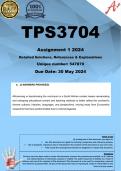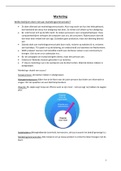TPS3704
Assignment 1 2024
Detailed Solutions, References & Explanations
Unique number: 547870
Due Date: 30 May 2024
a. (2 ANSWERS PROVIDED)
Africanising or decolonising the curriculum in a South African context means reevaluating
and reshaping educational content and teaching methods to better reflect the continent's
diverse cultures, histories, languages, and perspectives, moving away from Eurocentric
viewpoints that have predominated due to colonial legacies
Terms of use
By making use of this document you agree to:
• Use this document as a guide for learning, comparison and reference purpose,
• Not to duplicate, reproduce and/or misrepresent the contents of this document as your own work,
• Fully accept the consequences should you plagiarise or misuse this document.
Disclaimer
Extreme care has been used to create this document, however the contents are provided “as is” without
any representations or warranties, express or implied. The author assumes no liability as a result of
reliance and use of the contents of this document. This document is to be used for comparison, research
and reference purposes ONLY. No part of this document may be reproduced, resold or transmitted in any
form or by any means.
, a. (2 ANSWERS PROVIDED)
Africanising or decolonising the curriculum in a South African context means
reevaluating and reshaping educational content and teaching methods to better reflect
the continent's diverse cultures, histories, languages, and perspectives, moving away
from Eurocentric viewpoints that have predominated due to colonial legacies. This
involves incorporating African literature, philosophers, scientists, and historical events
into the syllabus across all subjects, from humanities to sciences. For instance,
teaching mathematics with examples drawn from African innovations like ancient
Egypt's geometry or Ethiopia's indigenous counting systems. It also demands
including African languages as mediums of instruction alongside English and
Afrikaans, to affirm the linguistic heritage of the majority. This holistic approach
promotes an inclusive education system that values African identities and knowledge
systems, ultimately empowering learners to see their world reflected in their studies
and understand their potential to contribute uniquely both locally and globally.
OR
Africanising or decolonising the curriculum from a South African perspective entails
recentering education to acknowledge, respect, and integrate African knowledge
systems, values, languages, and perspectives. This could mean diversifying reading
lists to include more African authors and scholars, incorporating indigenous African
languages alongside English and Afrikaans for instruction and communication, and
revising the historical narrative to fully represent Africa’s contributions and
perspectives. For example, a history class might shift focus from European colonisers
to the rich histories, cultures, and achievements of African civilizations and leaders,
thus fostering a more inclusive and representative educational environment.
OR
To Africanise/Decolonise the curriculum from a South African perspective involves
restructuring educational content and pedagogy to reflect Africa's rich history,
languages, cultures, and perspectives, prioritizing indigenous knowledge systems
alongside Western ones. Practically, this could mean incorporating African literature,
stories, and proverbs into language and literature courses, teaching African history
and achievements in science and mathematics classes, and recognizing the
continent's contributions to philosophy and the arts. For example, incorporating case
Disclaimer
Extreme care has been used to create this document, however the contents are provided “as is” without
any representations or warranties, express or implied. The author assumes no liability as a result of
reliance and use of the contents of this document. This document is to be used for comparison, research
and reference purposes ONLY. No part of this document may be reproduced, resold or transmitted in any
form or by any means.





